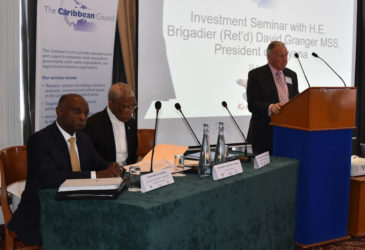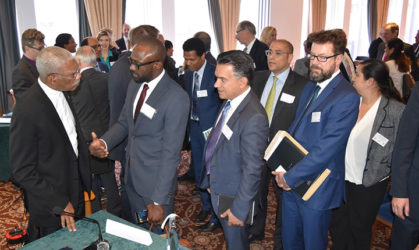Declaring Guyana “the best prospect for investment” President David Granger spent part of his visit to the United Kingdom on Tuesday attempting to convince foreign investors to bring their businesses to this country.
A press statement from the Ministry of the Presidency credited the president with describing Guyana as an exciting investment destination with several advantages and opportunities.
“We have the land, we have an intelligent English-speaking population, we have the resources, and I think people who are looking for something different; something unique, will come to Guyana. I am not suggesting that you leave Belize or Antigua or Barbados but I am suggesting for long-term development, Guyana is the best prospect for investment,” the president told the investment seminar, organised by the Caribbean Council in London.

He painted a glowing picture of Guyana’s potential and the ‘green’ state development policy, which he said would see the country taking advantage of its eco-tourism product, preserving its environment and pursuing ‘green’ energy development while taking advantage of coming oil and gas revenues to accomplish these goals.
“Oil and gas is a very attractive prospect… We probably wouldn’t start to produce oil and gas till maybe 2020… We will continue to develop our sources of renewable energy and at the same time use the revenues from the petroleum industry to funnel our development of infrastructure and education in particular, and ensure that other industries could be diversified away from what we call our six sisters; sugar, rice, bauxite, timber and gold and diamonds. Oil and gas is not going to distract us. We are going to ensure that the revenues… go into our Sovereign Wealth Fund, but we will also ensure that we continue to become a ‘green’ state by developing our sustainable energy resources,” President Granger said before calling for investments in solar and wind energy, biomass and hydropower.
He also, according to the release, stressed improvements in the local legal and regulatory environment and noted that the similarity between the country’s common law, parliamentary system and institutional infrastructure and that found in other Commonwealth countries means that there would be some ease of doing business for companies from those parts of the world.
“We can assure that your profits can be repatriated. We can assure you that our legal system, our Judiciary, our

Ombudsman, our Auditor General, our elections are all entirely in consonance with what is required in Western Europe and the Commonwealth. Only last year we had our Local Government Elections, which under the previous administration had been suspended for nearly two decades and when the elections were held, we created three new towns. The urbanisation of our hinterland is proceeding apace,” he said.
Granger’s statements about the country’s investment climate were supported by Gil Holzman, President and Chief Executive Officer of ECO Atlantic Oil and Gas, which has a stake in oil and gas exploration occurring on the Stabroek Block.
Holzman encouraged other investors to take a look at Guyana and said that the economic boom that Guyana is about to witness as a result of oil production will have a significant effect on several sectors such as real estate, hotels, tourism, airlines, shipping, education and healthcare and will create exciting opportunities.
“You will have 20,000 expats flying into the country and they will need hotel rooms. The big companies that are going to build the infrastructure, they will need areas next to the port. You will need better roads from the airport,” he said.
He added that while there is a need to develop capacity to manage the sector in Government Ministries and agencies, his interactions with the Ministry of Natural Resources and the Guyana Geology and Mines Commission have been heartening.
“These are all very savvy people; they are very responsible. They know that the big opportunity of the oil discovery, which is transformational for the country, should be dealt with very, very carefully… I know that your administration, Mr. President is speaking with everyone there is in the UN, in the United States, here in the United Kingdom, in Norway [and elsewhere] in order to learn from other people’s mistakes, in order to take the right measures going forward, taking the oil opportunity and making it for the greater good of your people and your country and I think you’re taking very impressive measures,” Holzman said.
British High Commissioner to Guyana, Greg Quinn who also spoke said that Guyana is moving in the right direction, particularly as it relates to the ease of doing business and the reduction of corruption.
“I think we went up 16 points on the ease of doing business between 2016 and 2017 and that was from 140 to 124 and the corruptions perception index, which went from 29 to 34… We believe that this is an Administration and a Government, which we can and want to work with and which has significant potential going forward,” he is reported to have said.
President Granger however acknowledged that a series deficiencies exist in the area of infrastructural development and noted that Government is focused on comprehensive development plans that include deep water harbours, aerodromes and road and bridge networks that link the coastland to the hinterland.
Minister of Foreign Affairs Carl Greenidge who was also present said that the country is working with its neighbours and international partners to look at the development of a deep water port that allows Guyana and other countries in South America to ship their goods to markets in North America and Europe.
President Granger, Greenidge, Quinn and Holzman were part of a panel which included Andy Thorne, Group Chairman of the Kestrel Group, which is involved in the shipping industry in Guyana. The session was facilitated by British Member of Parliament, Lord Bruce of Bennachie and in the audience were business executives from infrastructure, port development, oil and gas, tourism and hospitality and shipping, who are already operating in the Caribbean and Guyana or are interested in doing so, along with members of the diplomatic community.








